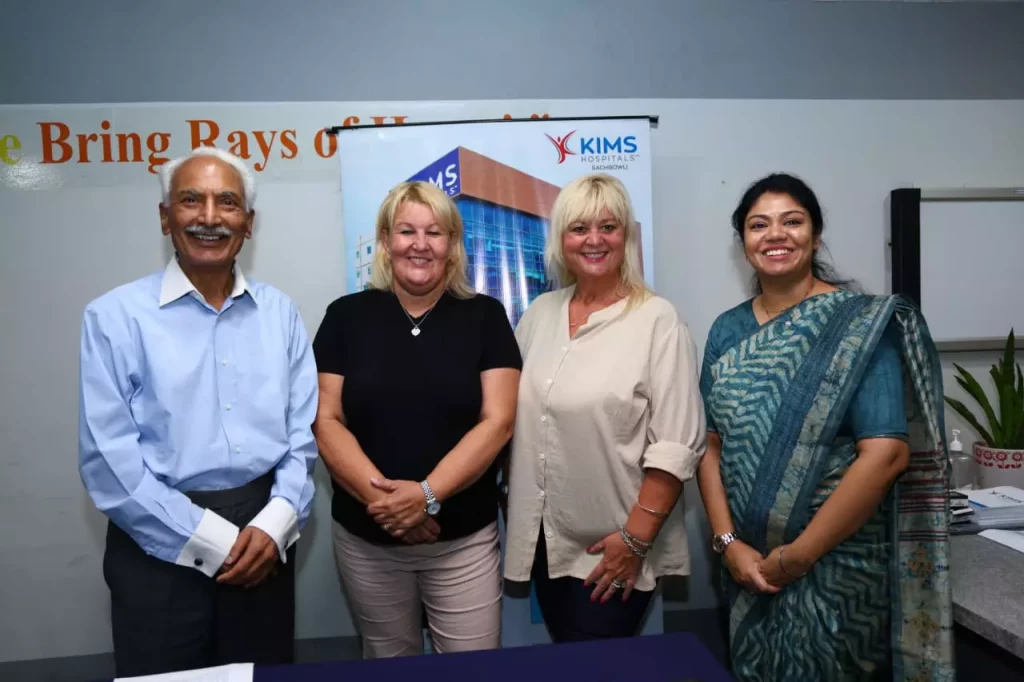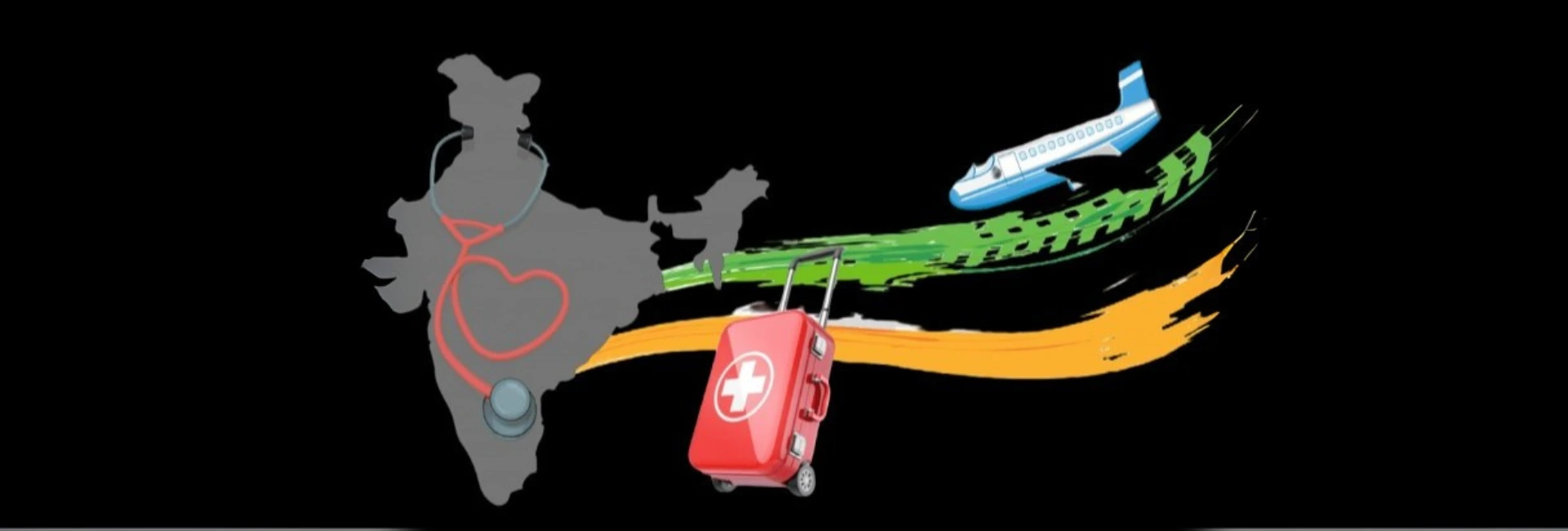(September 1, 2025) Globally, India stands 10th among 46 countries in the Medical Tourism Index 2020–21, with procedures priced 60–80 percent lower than in developed nations like the United States.
When Alexandria Fox, a British woman working as a taxi driver in London, travelled all the way to undergo bariatric surgery at KIMS Hospitals in Hyderabad recently — her health condition was at its worst. Weighing 102 kg, the 59-year-old suffered from hypertension, kidney failure and thyroid issues.
Within days, Dr. Kesava Reddy Mannur, Clinical Director of the Metabolic & Bariatric Surgery Department at KIMS, performed a Sleeve Gastrectomy procedure, in which two-thirds of the stomach was removed, reducing its size significantly. She recovered in 24 hours and returned to England last week — with a smile on her face.

The British taxi driver in London, travelled all the way to Hyderabad to undergo bariatric surgery
Medical tourism in India is growing rapidly. From complex surgeries, joint replacements and rare medical procedures, Indian hospitals are increasingly proving to be the most trusted destinations for global patients who have either lost hope or faced limited or super expensive options in their countries.
What makes India the most preferred medical tourism destination?
What sets India apart is not only the affordability of treatments but also the exceptional quality of outcomes that rival, and in specific areas, surpass those of developed nations, says renowned gastroenterologist Dr GV Rao, who is also the Director of the Asian Institute of Gastroenterology (AIG), Hyderabad.
“In high-end surgical domains such as Liver and Kidney Transplantation, the scale at which Indian centers operate is unparalleled,” he points out, in a chat with Global Indian.
For example, he says, some leading hospitals in India conduct more transplants in a year than several centers in the Western world combined. “This translates into a remarkable advantage: higher volumes give surgeons greater expertise, leading to superior outcomes for patients.”
Complex surgeries with global benchmarks
Referring to the recent treatment of a middle-aged African patient who was turned away from multiple centers abroad due to advanced liver failure, Dr Rao says within weeks of arriving in India, the patient successfully underwent a life-saving liver transplant. “Today, he is leading a normal life and continues to follow up with us remotely.”
At AIG Hospitals, says Dr Rao, doctors routinely perform complex liver resections, multi-visceral transplants, and advanced laparoscopic procedures with survival rates that are comparable, if not better, than most global benchmarks.
Transformative use of robotics
“The integration of robotic surgery into our practice has been transformative. Robotics has enabled us to perform highly precise procedures with minimal trauma, shorter hospital stays, and faster recovery,” informs Dr Rao.
He says it is heartening to see that unlike many Western settings where robotic surgery remains accessible to only a small percentage due to prohibitive costs, in India, hospitals are able to provide these cutting-edge technologies at a fraction of the expense without compromising quality.
Figures say it all
According to industry estimates, the medical tourism market was valued at $7.69 billion in 2024, drawing nearly 7.3 million foreign patients for various medical treatments. Despite the setbacks of the Covid-19 pandemic, India’s medical tourism sector remained strong.
The market is expected to grow further and touch $14.31 billion by 2029, according to a Mordor Intelligence report. India’s medical tourism industry is set for a growth rate of around 14–15 percent in the coming years, buoyed by the recent easing of visa regulations announced in the Union Budget 2025–26.
On the global stage, India ranks 10th among 46 countries in the Medical Tourism Index 2020–21, offering procedures at 60–80 percent lower costs compared to developed nations such as the US.

Right approach
Dr. Kesava Reddy Mannur, who operated upon the British national Alexandria, says she was extremely happy with the results (of the procedure) and the speed of her recovery.
“Unlike medication-based treatments, this surgery ensures long-lasting results when done with the right approach.” Dr. Mannur, a highly acclaimed surgeon with over 45 years of experience in London and 28 years in Bariatric surgery, told Global Indian.
Alexandria had a very positive mindset. “Given the physical demands of her job, she wanted to ensure her health did not hold her back, which motivated her to come to India for the surgery,” says Dr Mannur, adding that the procedure helped improve her overall quality of life and would increase the life span by at least a decade.
Patients from far and wide
Among the global patients, a large number are British patients are turning to India for medical treatment. The costs can be up to 70 percent lower than in the UK. For many, it offers an affordable alternative, especially when faced with high expenses or long waits for care under the National Health Services (NHS) – the UK’s top government health body.
According to Ministry of Tourism data (2023), medical travel made up a large share of visitors from different regions. Tourists from West Asia accounted for the highest proportion at 22.7 percent, followed by Africa at 21.2 percent and South Asia at 19.8 percent.
Satisfied patients
Recently, 56-year-old Toby James Burr from the UK suffered from severe knee pain that restricted his life. He researched hospitals worldwide, finally deciding to go with Shalby Hospitals in Ahmedabad, where Dr. Vikram Shah performed his total knee replacement using the innovative “Zero Technique.”
Within four days, Toby had undergone surgery, rehabilitation, and was walking pain-free. He praised the hospital’s advanced technology and personalised care, calling it a world-class experience.
Similarly, Bonnie, a professor from the University of Michigan, who was battling breast cancer for years, travelled to India and received treatment at CK Birla Hospital, New Delhi.
After complications during biopsy and limited treatment options in the US, her tumor became a painful, fungating mass. Doctors back home insisted on chemotherapy before surgery, but her health deteriorated further. At CK Birla Hospital, Dr. Mandeep Singh and his team performed a major surgery to remove the two kg tumor and reconstruct her chest wall using advanced techniques.
The doctors also cleared the affected lymph nodes from under her arm. To rebuild her chest, surgeons used muscle and tissue (latissimus dorsi flap) taken from her back. They used a special graft made from processed donor skin, called Acellular Dermal Matrix (ADM), to cover the wound. Bonnie recovered well and is now cancer-free.
View this post on Instagram
Fusion of cutting-edge technology
Tejesvi Rao Veerepalli CEO, Apollo Hospitals, Telangana Region says India provides a remarkable fusion of cutting-edge technology, highly skilled professionals from throughout the world, and affordability.
“The expense disparity when compared to Western countries can be life-altering for those who require complicated treatments,” he points out, speaking to Global Indian.
He says Indian hospitals are equipped with world-class infrastructure, offering robotic-assisted surgeries, advanced imaging, precision oncology, and state-of-the-art transplant facilities comparable to the best globally.
Internationally trained medical practitioners
Many Indian doctors are internationally trained and bring extensive experience from leading global institutions.
“Their expertise ensures high success rates in complex procedures such as cardiac surgeries, organ transplants, and cancer treatments,” says the CEO of Apollo Hospital adding, “This combination of technology, talent, and affordability makes India a preferred destination for international patients, transforming lives and giving hope where options are limited or treatment is unaffordable in their own countries.”
Also Read: From Tollywood legacy to Guinness glory: Dr. Surakshith Battina’s journey in women’s healthcare



